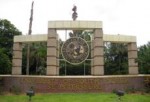USF St. Petersburg not perturbed by probation

After being put on probation Friday for failing to meet requirements for autonomous accreditation, USF St. Petersburg (USFSP) will know Monday exactly how it failed in meeting the compliance standards for its accreditation.
The Southern Association of Colleges and Schools (SACS) placed USFSP on probation for a period of one year for failing to meet two compliance standards out of 89.
Monday, SACS will release a disclosure statement on its Web site explaining the standards USFSP failed to meet in detail. Until then, USFSP knows only that standards weren’t met, but it doesn’t know why.
Tom Benberg, chief of staff of the commission on colleges of SACS, said the commission would follow up by sending a letter to USFSP Chancellor Karen White delineating the actions the commissioners took. The University will then have until April 2009 to present a monitoring report and show progress.
Though USFSP has been put on probation for one year, it has not lost its accreditation.
“One thing that is important to know is we are accredited,” said USFSP Regional Associate Vice Chancellor Chris D’Elia.
One of the standards not met concerns general education requirements. Comprehensive standard No. 3.5.1 requires that USFSP has a system that outlines how students achieve their general education requirements.
“The institution is expected to clearly state the competency and clearly assess how the students are achieving those competencies,” Benberg said.
The other standard not met, called Federal Requirement 4.1 by the Foundation for Quality Enhancement of SACS, requires USFSP to monitor student achievement after graduation.
In February 2004, USFSP submitted an application to SACS stating that it sought separate accreditation. In March 2006, SACS responded to this request by saying that several standards were not met. The standards that have not been met were part of the original list.
In June 2006, however, the University was awarded “initial accreditation,” anticipating reaffirmation in 2011.
“Eighty-seven out of the 89 we did right,” D’Elia said. “This is an evolutionary process. We are going to make it our highest institutional priority.”
Though the accreditation issue relates only to the St. Petersburg campus, USF Tampa plans to work along-side USFSP to get the issue resolved, said Vice President of Communications Michael Hoad.
USFSP can remain on probation for a maximum of two years before losing accreditation. Both administrations are confident that they will not lose accreditation and that the issue will be resolved by next year.
“Our sense is, it’s not that it’s some sort of punishment,” Hoad said. “This is a message that says ‘pay attention.’ It’s not a ‘you’re bad people’ message.”
It is rare that SACS strips a university from its accreditation and no Florida institution has ever been stripped.
“It’s not a customary thing,” Benberg said. “Most colleges and universities are able to correct the problem that exists.”
Matthew Foulen, a USFSP student majoring in finance, said that he’s a little concerned but trusts that it’ll be taken care of.
“I’m sure USF will do what it takes to fix this,” Foulen said. “FAMU had probation and theirs got taken off.”







